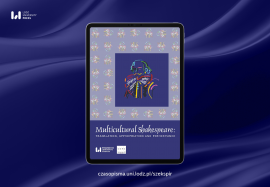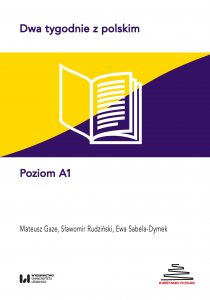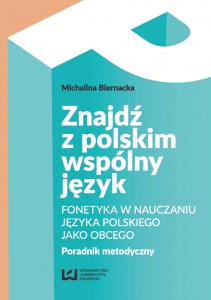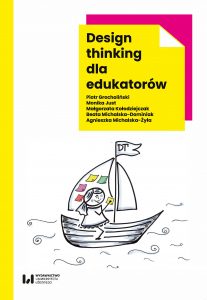Multicultural Shakespeare: Translation, Appropriation and Performance | Vol. 28 No. 43: Crossing Borders with Shakespeare since 1945: Central and Eastern European Roots and Routes
Opublikowano: 10 May 2024

Multicultural Shakespeare is an international journal devoted to Shakespearean studies; it is a forum in which researchers, especially those from non-English-speaking backgrounds, can air local concerns and themes that contribute to the creation and understanding of Shakespeare as global phenomenon.
Initially devoted mainly to translations, Multicultural Shakespeare developed into a publication mediating vigorous discussions on the adaptation of Shakespeare’s texts, their ontology and cross-cultural significance. It created an opportunity to present the universal dimension of Shakespeare’s works by focusing on their local values found in the cultures of Australia, Brazil, China, Finland, France, Germany, Great Britain, Greece, Holland, Hungary, India, Israel, Japan, Korea, Norway, Poland, Romania, Russia, Spain, Switzerland, and the USA.
Multicultural Shakespeare appeared for the first time in 1972 as Shakespeare Translation on the initiative of Professor Toshikazu Oyama, the President of Seijo University in Japan. Since then it has undergone various changes. In 1986 it became Shakespeare Worldwide: Translation and Adaptation, whose editor was Professor Yoshiko Kawachi, and in 2003, it took on its present title (and since then has been edited by Professor Yoshiko Kawachi and Professor Krystyna Kujawińska Courtney). From its very beginning, Multicultural Shakespeare has aroused interest around the world and attracted many prominent scholars, soon becoming an important publication in Shakespeare studies on a global scale.
First printed in Japan, now published in Łódź, Poland, Multicultural Shakespeare seeks co-operation with people who make, teach or simply enjoy theatre and literature, and who are interested in addressing the problems of translating, staging, reading and teaching Shakespeare worldwide.
We welcome contributions in various areas of Shakespearean studies, page and stage renditions of his plays, translations, critical analyses, book and theatre reviews.
Articles:
Introduction: East-Central and Central-East Europe as an Imagined Space for Shakespeare
Šárka Havlíčková Kysová, Ivona Mišterová
Kirilka Stavreva, Boika Sokolova, Natália Pikli, Jana Wild
The article discusses the historical mutability and political connotations of the geographical signifiers Eastern and Central Europe, and the chronotope Post-Soviet / Post-Communist Europe. It considers the tensions present in these denominations, arguing for the need to defamiliarize and re-define them. Three major sections survey the circumstances that shaped the referential and connotative values of the terms from the Enlightenment to the era of European integration. The article notes commonalities in the defining experiences of the countries in the east of Europe: their emergence from the ruins of former empires (Habsburg, Russian, Ottoman) and of the Soviet bloc. It considers whether the spatial terms have been developed from within or imposed from the outside, and discusses how they have perpetuated stereotypes of the region under consideration and its people(s) and generated enduring cultural myths. It concludes by proposing terms that recoup the cultural significance of the region—East-Central Europe, its close correlative East-Centre Europe, the neologism Europeast—and by alerting scholars working on transnational Shakespeare adaptations to the importance of recontextualizing research in individual national traditions as part of a larger investigation of the mutual translatability of shared experiences.
Politics, Shakespeare, East-Central Europe: Theatrical Border Crossings
Zsolt Almási, Krystyna Kujawińska Courtney, Mădălina Nicolaescu, Klára Škrobánková, Ema Vyroubalova, Oana-Alis Zaharia
This essay discusses how productions of Shakespeare’s plays that transcend various geographical, national, and linguistic boundaries have influenced the theatrical-political discourse in East-Central Europe in the twenty-first century. It focuses primarily on the work of four internationally-established directors: Andrei Şerban (Romania), Jan Klata (Poland), David Jařab (Czech Republic), and Matei Vișniec (Romania), whose works have facilitated interregional cultural exchange, promoting artistic innovation and experimentation in the region and beyond. Among the boundary-crossing productions analysed in detail are Vișniec’s Richard III will not Take Place, Jařab’s Macbeth – Too Much Blood, Klata’s Measure for Measure, and Serban’s Richard III. The essay also notes that while there has been a relative scarcity of Shakespearean productions in this region engaging closely with gender and race inequalities, productions such as Klata’s African Tales or Vladimír Morávek’s Othello manage to work with these politically charged topics in subtler but still productive ways. The essay concludes that the region’s shared historical experience of totalitarian regimes followed by the struggles of nascent democracies, provides a fertile ground for a diverse and internationally ambitious Shakespearean theatre.
Popular and Populist Shakespearean Transcreations in Central and Eastern Europe
Nicoleta Cinpoeş, Kornélia Deres, Jacek Fabiszak, Kinga Földváry, Veronika Schandl
The article discusses the variety of ways in which the terms “popular” or “populist” could be associated with postwar Shakespearean transcreations in the Central and Eastern European region, pointing out how performers and adaptors challenged the canonical, highbrow status of Shakespeare and used his oeuvre as raw material in experimental forms and genres. Following a discussion on the variety of socio-historical contexts which inspired noteworthy popular and/or populist reworkings in several Central and Eastern European countries, the article takes a more in-depth look at a few specific comic genres, particularly the burlesque and the cabaret in a theoretical framework, and concludes by examining post-1989 experimental theatre practices.
Anna Cetera-Włodarczyk, Šárka Havlíčková Kysová, Anna Kowalcze-Pawlik, Ivona Mišterová, Gabriella Reuss
This collectively authored position paper discusses “hybrid” Shakespeares in Central and Eastern Europe, focusing on productions that offer formal experimentation and transnational perspectives. While their contexts remain regional, they provide an insight into how Shakspeare has been mobilised regionally. The paper consists of four distinct parts, each considering Shakespeare in a hybrid form: in opera, dance and musical theatre as well as puppetry in the transnational, regional context. The general discussions of Shakespeare’s presence/appropriation in these art forms are followed by case studies that illustrate the significance of hybridity that characterises Shakespeare in the Central and Eastern European transnational context. Our brief analyses and selected case studies suggest a need for a detailed study of Shakespeare and performative arts in Central and Eastern Europe that would concentrate on the transgressive impulse these theatrical blends realised through formal experiment and artistic innovation.
“You have served me well:” The Shakespeare Empire in Central Europe
Pavel Drábek
Shakespeare has often served as an instrument of cultural colonialism. In this essay I argue that the current practice of Shakespeare studies in many ways replicates this pattern. By priming the discourse through Shakespeare, it perpetuates logocentric regimes of knowledge that tend to impose reductive perspectives—such as the binaries of Shakespeare’s original–adaptation and that of the author–adapter, but also scripture–exegesis, London–province or London–Continent, centre–periphery and empire–colonial subjects. Drawing on case studies from five centuries—of sixteenth- and seventeenth-century travelling performers, through eighteenth-century German theatre, to twentieth- and twenty-first-century writing and performance, I argue for a need to revisit the logocentric and colonial epistemology. I call for breaking away from the critical heritage of the “Shakespeare Empire,” for reconceptualising how we use Shakespeare, and for refocusing our critical attentions to the thick descriptions of cultures and crafts that make and host Shakespeare.
“Henry V”: A Report on the Condition of the World
Marta Gibińska
The central interest of the paper is concentrated on an online production of Henry V in 2020. The project is based on a new Polish translation by Piotr Kamiński and produced by Dariusz Rosiak, a journalist, as one of his regular Reports on the Condition of the World published on YouTube. Realised as a reading performance by three actors in front of an empty row of chairs, the production brings an innovative and revealing interpretation of the play, breaking new ground in the Polish reception of Shakespeare’s histories.
The paper offers a brief review of the presence of history plays in Polish reception and introductory information on Rosiak’s YouTube channel and Kamiński’s translation as a background to a critical analysis of the production and its relevance to the here and now of our world.
“…noxiousness of my work:” Miroslav Macháček’s 1971 “Henry V” at the Normalized National Theatre
Martin Pšenička
The essay focuses on the 1971 production of William Shakespeare’s rarely staged historical drama Henry V, directed by Czech director Miroslav Macháček at the Prague National Theatre in a new translation by Czech literary historian and translator Břetislav Hodek. Macháček staged the play shortly after the 1968 occupation of Czechoslovakia by Warsaw Pact troops. The premiere of the play provoked negative reactions from influential Communist officials, including the leading post-1968 politician Vasil Biľak. Macháček’s performance, which, in the director’s words, was intended as a universal anti-war parable, became a political topicality that the newly emerging normalisation authorities understood as a deliberate political, anti-socialist provocation. The essay traces the background of the production, including the translation of the play, and the consequences of the staging for Macháček. At the same time, it attempts to unravel a number of ambiguities and ambivalences associated with the period of normalization (1970s and 1980s) and its research. A special focus is given to the production itself as it disturbed the audience with its ambivalence. In this analytical section, the essay works with Norman Rabkin’s conception of Henry V, as presented in his essay “Rabbits, Ducks, and Henry V,” which traces Shakespeare’s complex grasp of the historical figure and the events associated with Henry. Macháček, who staged the play several years before this essay by Rabkin, pursued similar intentions with his stage concept. It was this unsettling ambivalence that carried within it the features of both a parable and a political gesture that spoke out against the communist occupation.
Dramaturgy of “Hamlet”(s) in Czech Theatre between 2000 and 2023
David Drozd
The paper focuses on five Czech productions of Hamlet that attracted the most critical and public attention between 2000 and 2023. Namely, the productions directed by Miroslav Krobot (2006), Jan Mikulášek (2009), Daniela Špinar (2013), Michal Dočekal (2021) and finally the most recent version by Jakub Čermák (2022). All five performances could be seen as contemporary reinterpretations of a classical text using a (post-)modern stylistic approach, as examples of post-millennium Hamlets. The paper discusses dramaturgical choices (such as the conceptualisation of the ghost, the mousetrap scene, or the character of Fortinbras) in order to identify and analyse possibilities for interpreting Hamlet as a political drama in the context of Czech performance tradition and the current political situation. The results show that performances generally present variations of Hamlet as a family drama, foregrounding different issues of memory and body, while the political reading is obsolete.
Framing Polish-Jewish Relations Through Shakespeare in Post-war and Contemporary Polish Theatre
Tomasz Kowalski
The paper aims to analyse how the staging of Shakespeare’s texts in post-war and contemporary Poland reflected the indifferent and hostile attitudes of Poles towards Jews, particularly during the Holocaust, and the distortions and gaps in the collective memory regarding the events. In the first part, the author focuses on Hamlet Study (dir. Jerzy Grotowski) performed in 1964 by Laboratory Theatre of 13 Rows in Opole, which is symptomatic of silencing the matter during the communist period. The second part draws from the statement of Jan Ciechowicz, a Polish theatre historian, who claimed that “the Holocaust killed Shylock for Polish stage.” While verifying it, the author analyses selected aspects of three productions directed by Krzysztof Warlikowski (The Tempest (2003), The Merchant of Venice (1994) and The African Tales by Shakespeare (2011)) and juxtaposes them against the background of the changes in collective memory. He argues that the most cogent productions concerning Polish attitudes towards Jews are those that position the audience as witnesses of the acts of re-enacted violence and thus provoke an affective response.
No Calm After the Storm. A Decade of “The Tempest” in Polish Theatres (2012–2021)
Agnieszka Romanowska
The article discusses twelve productions based on The Tempest shown in Polish theatres in the years 2012-21, a decade whose challenges included escalation of the migration crisis, increasing climate change, social and political unrest around much of the globe, and the covid pandemic, but which was also marked by important Shakespearean anniversaries. In order to inspect the play’s significance for contemporary Polish audiences the productions are scrutinised in relation to four categories of interrelated issues: modification of characters, depiction of suspended reality connected with sleep, dreaming, memory and recollection, references to current social and political challenges, and employment of the play’s meta-artistic potential. The productions’ interpretative tendencies reveal a number of common denominators which are analysed with an aim of explaining why, in today’s Poland, the possibility of reconciliation and return to some form of re-established order that the playwright contemplates is seen as very difficult, if not impossible.
Ivona Mišterová, Filip Krajník
The present article outlines the stage history of Christopher Marlowe’s history Edward II on Czech stages, focusing chiefly on how the respective directors approached the titular character of Marlowe’s play and his sexuality. The study focuses on two post-2000 productions of the play: Diego de Brea’s Edvard Drugy for the Slovenian National Theatre, which toured to the 16th “Divadlo” International Theatre Festival in Pilsen, West Bohemia, in 2008; and Jakub Čermák’s production of Edvard II. for the independent Czech theatre company “Depresivní děti touží po penězích” (Depressive Children Yearn for Money) that premiered in 2023 in Prague. Since for both Czechs and Slovenians, King Edward II is a minor figure of English history and Elizabethan history plays are generally less appealing to them than other genres, both the directors sideline the political dimension of the story to fully explore the issue of social and sexual norms and relate it to current social and cultural discussions both in the West and the former Eastern Bloc. Stressing the motif of social and sexual otherness even more bravely than most recent Western productions, de Brea and Čermák offered not only valuable contributions to both local and global reception of Marlowe’s Edward II, but also raised the visibility of LGBT theatre in a region where it has only a modest history and tradition.
Zsolt Almási
In this paper I endeavour to retell a partial history of the Hungarian translation of Hamlet’s commentary: “This is one Lucianus, nephew to the King!” (3:2:239) on the “Murder of Gonzago,” aiming to elucidate the intricate interplay between translation, cultural discourse, and socio-political dynamics. Hamlet’s commentary, seemingly straightforward yet laden with complexity, poses implications capable of reshaping the trajectory and purpose of his theatrical experiment, crafted to probe and establish Claudius’ guilt. The partial history of translations encompasses the epochs of Ferenc Kazinczy (18th century) and János Arany (19th century) up to the modern renderings of István Eörsi and Ádám Nádasdy (20th-21st centuries). Within this framework, I claim that exploring these translations of Hamlet’s commentary offers a gauge of Hamlet’s position in Hungarian cultural discourse. The evolving connotations of words, reflective of linguistic shifts, imbue layered meanings not only onto the statement itself but also onto the theatrical experiment it encapsulates. This exploration of translation, interpretation, and linguistic evolution sheds light on Shakespeare’s and Hamlet’s socio-cultural-political role in Hungary, as translations serve not merely as transparent channels of meaning but also as reflections on the political and cultural commitments of translators and their audiences.
Uroš Trefalt
This study aims to address the stigmatization and reductionism of Central European culture by many scholars and to decentralize it. At the Crossing Borders with Shakespeare Since 1945 conference, the roundtable discussion raised questions about naming and defining “Central Europe” and revealed several discrepancies. However, the discussion lacked cultural, political, and historical context. To address this, the author examines a lesser-known artistic genre, puppet theatre, for answers and comparisons. Zlatko Bourek, a Croatian artist and director, offers a unique perspective on the theatre of the 1980s and serves as an example of the diversity and heterogeneity of Central European cultural expression. Bourek’s work draws from the tradition of Central European puppetry and explores connections between the Iron Curtain and Yugoslavia. His artistic style is exemplified in his adaptation of Tom Stoppard’s play Fifteen-Minute Hamlet, which masterfully condenses the entire plot of William Shakespeare’s Hamlet into a fifteen-minute performance. Bourek’s concept of combining Shakespearean tragedy with farce, presented through Japanese traditional Bunraku theatre, represents an important experiment of the 1980s. The use of syncretism and the aesthetics of ugliness are notable features of this experiment. It is a breakthrough in the perceived history of puppet theatre for adults and an aesthetic experiment in the era of Central European totalitarianism.
Other:
Šárka Havlíčková Kysová, Ivona Mišterová
Boika Sokolova
Monica Matei-Chesnoiu, Coen Heijes
Cynthia J. Cyrus
Komentarze
Ten post dostępny jest także w języku: Polish





